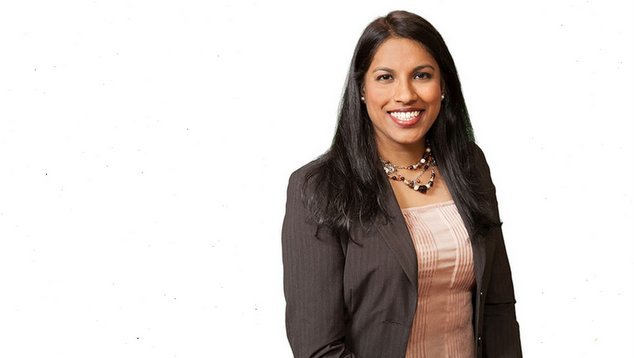
Karina Okotel from the Coalition for Marriage has criticised people who support marriage equality saying too often they resort to racist abuse, and because of this most people are keeping secret the real answer about how they responded in the marriage survey.
The Vice President of the Liberal Party was appearing on the Sky News program Karvelas to discuss the issue of marriage, while City of Sydney Councillor Christine Forster appeared to represent the Equality campaign.
Last month Forster and Okotel debated marriage equality, with Patricia Karvelas as moderator, on ABC Radio National’s Breakfast program. On that occasion Okotel tied herself in knots trying to explain how churches would be restricted in teaching biblical views if same sex marriage was allowed.
On this occasion Okotel got into a heated back and forth with Karvelas after she argued that it was important the state did not give further recognition to rainbow families.
During the debate Okotel said she believed the results of the marriage survey would be very close, rejecting polls that have indicated up to 70% of Australians support change. Okotel said the idea that the majority of people supported marriage equality was “totally unfounded”.
Okotel said the evidence she’s seen was that a large number of Australians are publicly telling people they are voting ‘yes’ but in reality they are voting ‘no’.
“They’re telling everyone that they’re voting yes, because they are scared of the abuse that they face if they say they’ve voted ‘no'” Okotel said.
Okotel said people who supported the no case were being subjected to a “torrent of abuse” and were labeled as “homophobes” and “bigots”.
She said people in the no campaign who were from different ethnic backgrounds were commonly racially abused by people who support same sex marriage, while no campaigner who were white are regularly called Nazis.
Forster said that kind of behaviour that was describing should be condemned by people on all sides of the debate.
Host Patricia Karvelas asked Okotel what types of religious protections the ‘no’ campaign would like to see added to marriage legislation should the ‘yes’ vote be successful.
Okotel refused to answer specific questions about whether people in ancillary services to the wedding industry, such as florists and bakers, should be allowed to discriminate against same sex couples.
“I don’t know how you can guarantee that those religious exemptions would stay in law.” Okotel said, citing often quoted examples from overseas. “There is no way you can guarantee those religious exemptions.”
Karvelas responded by saying that with any piece of legislation there was always the possibility that it could be changed by a future government, and asked Okotel if she could outline what religious protections she would like to see in potential legislation.
“I think the issue is there is no way to guarantee that religious exemptions won’t be over written.” Okotel said.
The Liberal party Vice President said that there was only a short history of countries allowing same sex couples to marry and overseas examples showed religious freedoms were quickly eroded.
When asked if she believed countries such as England and the United States of America had been fundamentally changed by allowing marriage equality Okotel said there had been significant changes to those societies.
“There are very significant consequences. There are consequences in terms of the impact on free speech, in terms of religious freedom… also in terms of parent rights, and there are a number of children who have grown up as children of same sex parents – who’ve been married, and haven’t had the opportunity to know their biological parents, because when you legalise same sex marriage what you’re saying is…”
Host Patricia Karvelas cut Okotel off and asked how she could claim same sex couples with children was a result of allowing same sex couples to marry, when those families already exist.
“Yes it is, but that’s in a minority of instances.” Okotel said.
“How is it a minority of instances, are you saying all of a sudden it will become the majority? On what basis do you base that on?” Karvelas challenged.
“Marriage is about the founding of a family, and when your talking about legalising same sex marriage, what you’re talking about is creating a new institution where children can be born, can be brought up in that institution. Now if children are being born in a same sex relationship – that is the state saying that by intention it will be creating families where kids will not have the opportunity to know one, or more, of their biological parents.” Okotel said.
“But the law already allows same sex couples to both have their names on birth certificates. So what will change?” Karvelas asked.
“Marriage is about having kids.” Okotel said.
“Lots of people get married and don’t have children” Karvelas responded.
“Indeed, but that’s the exception to the rule.” Okotel said. “There are different circumstances all the time, but by in large that is the purpose of marriage. If that’s not the purpose of marriage then what is this campaign about, what is marriage equality about?”
Forster said marriage equality was simply about all Australians being equal before the law.
“All Australians being able to get married, if they choose to, to the person they love. That is all marriage equality is about, that is all this campaign is about, asking people whether they believe same sex couples should be allowed to marry, just as heterosexual couples can.” Forster said.
OIP Staff
Support OUTinPerth
Thanks for reading OUTinPerth. We can only create LGBTIQA+ focused media with your help.
If you can help support our work, please consider assisting us through a one-off contribution to our GoFundMe campaign, or a regular contribution through our Patreon appeal.





